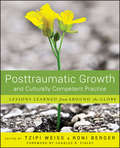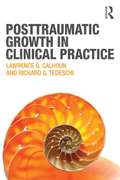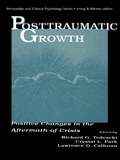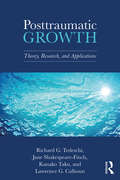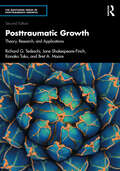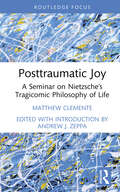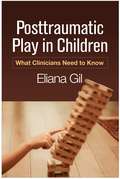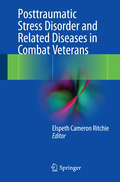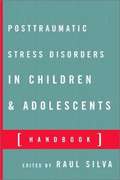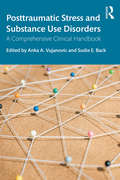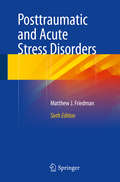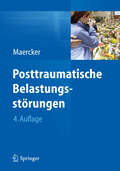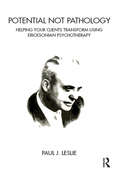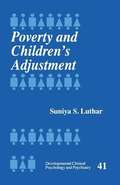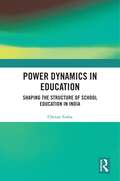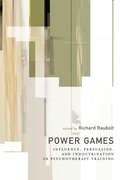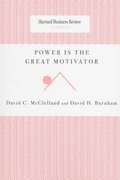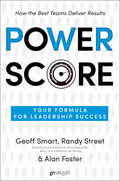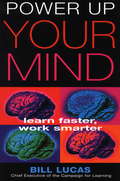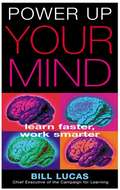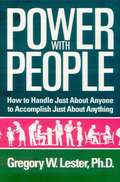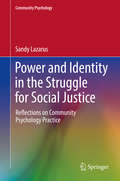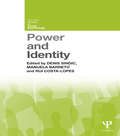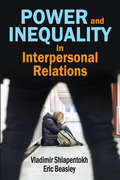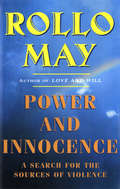- Table View
- List View
Posttraumatic Growth and Culturally Competent Practice
by Tzipi Weiss Roni Berger"Posttraumatic Growth and Culturally Competent Practice: Lessons Learned from Around the Globe brings welcome attention to applying PTG to culturally competent practice worldwide. It delivers on the promise embedded in its title: lots of lessons within the fourteen chapters. " -From the Foreword by Charles R. Figley, PhD, Kurzweg Chair in Disaster Mental Health, Tulane University, New Orleans The latest advances in the theoretical, empirical, and clinical aspects of Posttraumatic Growth Posttraumatic Growth and Culturally Competent Practice offers contributions from an international group of experts in posttraumatic growth (PTG) within diverse cultures and subcultures. It uniquely illuminates the nature, meaning, and clinical implications of PTG across a wide range of sociocultural contexts. Edited by Tzipi Weiss and Roni Berger-recognized experts in the areas of stress, coping, and PTG-this book features contributions by an international panel of renowned scholars and clinicians, offering a truly global perspective of PTG in cultures and regions including: The Middle East Israel Germany The Netherlands Japan China Australia Latinos in the U. S. Offering research-based insights and practical interventions, this collection enables practitioners to offer informed and culturally sensitive services to those who have survived trauma in different parts of the world, and to support these survivors as they grow and harvest benefits from their ordeal.
Posttraumatic Growth in Clinical Practice
by Lawrence G. Calhoun Richard G. TedeschiFrom the authors who pioneered the concept of posttraumatic growth comes Posttraumatic Growth in Clinical Practice, a book that brings the study of growth after trauma into the twenty-first century. Clinicians will find a framework that’s easy to use and flexible enough to be tailored to the needs of particular clients and specific therapeutic approaches. And, because it utilizes a model of relating described as "expert companionship," clinicians learn how to become most empathically effective in helping a variety of trauma survivors. Clinicians will come away from this book having learned how to assess posttraumatic growth, how to address it in treatment, and they’ll also have a basic grasp of the ways the changes they’re promoting will be received in various cultural contexts. Case examples show how utilizing a process developed from an empirically-based model of posttraumatic growth can promote important personal changes in the aftermath of traumatic events.
Posttraumatic Growth: Positive Changes in the Aftermath of Crisis
by Crystal L. Park Lawrence G. Calhoun Richard G. TedeschiThat which does not kill us makes us stronger. (Nietzsche) The phenomenon of positive personal change following devastating events has been recognized since ancient times, but given little attention by contemporary psychologists and psychiatrists, who have tended to focus on the negative consequences of stress. In recent years, evidence from diverse fields has converged to suggest the reality and pervasive importance of the processes the editors sum up as posttraumatic growth. This volume offers the first comprehensive overview of these processes. The authors address a variety of traumas--among them bereavement, physical disability, terminal illness, combat, rape, and natural disasters--following which experiences of growth have been reported. How can sufferers from posttraumatic stress disorder best be helped? What does "resilience" in the face of high risk mean? Which personality characteristics facilitate growth? To what extent is personality change possible in adulthood? How can concepts like happiness and self-actualization be operationalized? What role do changing belief systems, schemas, or "assumptive worlds" play in positive adaptation? Is "stress innoculation" possible? How do spiritual beliefs become central for many people struck by trauma, and how are posttraumatic growth and recovery from substance abuse or the crises of serious physical illnesses linked? Such questions have concerned not only the recently defined and expanding group of "traumatologists," but also therapists of all sorts, personality and social psychologists, developmental and cognitive researchers, specialists in health psychology and behavioral medicine, and those who study religion and mental health. Overcoming the challenges of life's worst experiences can catalyze new opportunities for individual and social development. Learning about persons who discover or create the perception of positive change in their lives may shed light on the problems of those who continue to suffer. Posttraumatic Growth will stimulate dialogue among personality and social psychologists and clinicians, and influence the theoretical foundations and clinical agendas of investigators and practitioners alike.
Posttraumatic Growth: Theory, Research, and Applications
by Lawrence G. Calhoun Richard G. Tedeschi Jane Shakespeare-Finch Kanako TakuPosttraumatic Growth reworks and overhauls the seminal 2006 Handbook of Posttraumatic Growth. It provides a wide range of answers to questions concerning knowledge of posttraumatic growth (PTG) theory, its synthesis and contrast with other theories and models, and its applications in diverse settings. The book starts with an overview of the history, components, and outcomes of PTG. Next, chapters review quantitative, qualitative, and cross-cultural research on PTG, including in relation to cognitive function, identity formation, cross-national and gender differences, and similarities and differences between adults and children. The final section shows readers how to facilitate optimal outcomes with PTG at the level of the individual, the group, the community, and society.
Posttraumatic Growth: Theory, Research, and Applications (The Routledge Series in Posttraumatic Growth)
by Bret A. Moore Richard G. Tedeschi Jane Shakespeare-Finch Kanako TakuThe new edition of Posttraumatic Growth: Theory, Research, and Applications includes the latest developments in the science of posttraumatic growth, including responses to the COVID-19 pandemic, epigenetics, and new interventions to facilitate growth after trauma.The book provides a wide range of answers to questions about the theory behind posttraumatic growth (PTG), its synthesis and contrast with other theories and models, and its applications in diverse settings. Posttraumatic Growth starts with an overview of the history, components, and outcomes of PTG. Next, chapters review quantitative, qualitative, and cross-cultural research on PTG, including in relation to cognitive function, identity formation, cross-national and gender differences, and similarities and differences between adults and children. The final section shows readers how to facilitate optimal outcomes with PTG at the level of the individual, the group, the community, and society.
Posttraumatic Joy: A Seminar on Nietzsche’s Tragicomic Philosophy of Life
by Matthew ClementePosttraumatic Joy presents the major themes and ideas of Nietzsche’s corpus from a continental and psychoanalytic perspective with a particular bent toward how they might illuminate ways of coping with and living beyond trauma and suffering. Through a series of transcribed and edited lectures—originally delivered as a part of the "Nietzsche for Clinicians" workshop run through the Center for Psychological Humanities and Ethics at Boston College—this work traces the genesis of such fundamental psychoanalytic concepts as repression, the death drive, and the Oedipus complex to the works of one of philosophy’s most audacious and original thinkers. Reading Nietzsche not as a philosopher in the traditional sense, but as a proto-psychoanalyst, a precursor to Freud and Lacan, this work explores his understanding of the origins of morality, the value of sublimation, the movement from mourning to melancholia—or, in Nietzsche’s terms, from trauma to tragedy—and the possibility of a life lived in affirmation and self-overcoming. This interdisciplinary book will be of interest to scholars and practitioners whose work intersects with continental philosophy and theoretical and philosophical psychology. This includes any psychotherapist, social worker, psychoanalyst, or pastoral counselor with an interest in understanding the deeply psychological philosophy of one of history’s greatest thinkers.
Posttraumatic Play in Children: What Clinicians Need to Know
by Eliana GilFrom leading expert Eliana Gil, this book provides child clinicians with essential knowledge and tools for evaluating and working with posttraumatic play. Such play, which is often repetitive and disturbing, may help resolve traumatic experiences--but can also become toxic. The book guides the clinician to determine what is going on with a given child and intervene sensitively and effectively. Evocative case material is interwoven with up-to-date information on the developmental impact of trauma and ways to facilitate children's natural reparative capacities. A reproducible assessment checklist to help clinicians differentiate between useful and dangerous posttraumatic play can be downloaded and printed in a convenient 8 1/2" x 11" size.
Posttraumatic Stress Disorder and Related Diseases in Combat Veterans
by Elspeth Cameron RitchieThis book takes a case-based approach to addressing the challenges psychiatrists and other clinicians face when working with American combat veterans after their return from a war zone. Written by experts, the book concentrates on a wide variety of concerns associated with posttraumatic stress disorder (PTSD), including different treatments of PTSD. The text also looks at PTSD comorbidities, such as depression and traumatic brain injury (TBI) and other conditions masquerading as PTSD. Finally, the authors touch on other subjects concerning returning veterans, including pain, disability, facing the end of a career, sleep problems , suicidal thoughts, violence, , and mefloquine "toxidrome". Each case study includes a case presentation, diagnosis and assessment, treatment and management, outcome and case resolution, and clinical pearls and pitfalls. Post-Traumatic Stress Disorder and Related Diseases in Combat Veterans is a valuable resource for civilian and military mental health practitioners, and primary care physicians on how to treat patients returning from active war zones.
Posttraumatic Stress Disorder in Children and Adolescents Handbook
by Raul R. SilvaThis handbook is intended to provide clinicians with a reference guide to the most salient issues of post-traumatic stress disorder (PTSD), stress, trauma, and the concurrent conditions that affect children and adolescents.
Posttraumatic Stress and Substance Use Disorders: A Comprehensive Clinical Handbook
by Anka A. Vujanovic Sudie E. BackPosttraumatic Stress and Substance Use Disorders summarizes the state of the field from a biopsychosocial perspective, addressing key domains of interest to clinicians, students, instructors, and researchers. This book is a valuable resource and reference guide for multidisciplinary practitioners and scientists interested in the evidence-based assessment and treatment of posttraumatic stress and substance use disorders. Chapters written by leaders in the field cover the latest research on assessment, diagnosis, evidence-based treatments, future directions, and much more.
Posttraumatic and Acute Stress Disorders
by Matthew J. FriedmanA handy, easy-to-read reference for the diagnosis and treatment of posttraumatic and acute stress disorders, this important 6th edition has been revised and updated extensively, offering a wealth of new information in a concise format of 6 sections. The new DSM-5 diagnostic criteria for PTSD and Acute Stress Disorder (ASD) are discussed, in depth, in Chapters 2 and 6, respectively. In addition, updated tables listing instruments for assessing diagnosis and symptom severity are cited and annotated in seven appendices, as in previous editions. Chapters 3-5 have been revised to keep pace with the ever-expanding literature on treatment of PTSD. This is especially true in Chapter 4 where, in addition to a focus on evidence-based cognitive-behavioral therapy, CBT and other individual psychosocial treatments (e. g. eye movement desensitization and reprocessing, EMDR), the growing literature is presented on couples, family, group and school-based treatments for adults, children and adolescents. Chapter 5 reviews the pathophysiology of PTSD and evidence-based pharmacotherapy for the disorder. Chapter 6 addresses both normal acute stress reactions and clinically significant ASD, as well as effective interventions for each. A comprehensive, sophisticated, practical reference for all clinicians, Posttraumatic and Acute Stress Disorders, 6th Edition is an invaluable resource designed to guide the best clinical attention for individuals suffering from posttraumatic an d acute stress disorders.
Posttraumatische Belastungsstörungen
by Andreas MaerckerGewalterfahrungen, Unfälle, Katastrophen oder Todesfälle im nahen Umfeld, extreme Situationen können zu einer posttraumatischen Belastungsstörung führen. Darunter werden unterschiedliche psychische und psychosomatische Symptome zusammengefasst, die als Langzeitfolgen auch noch Jahre nach dem belastenden Erlebnis auftauchen können. Heute gibt es eine Vielzahl von Interventionen, eine PTSD wirksam zu behandeln oder ihr durch frühzeitige Therapie entgegen zu wirken. Die Neuauflage des 1997 in erster Auflage erschienen Werks wurde umfassend überarbeitet und erweitert: Neu konzipiert oder wesentlich revidiert in der 4. Auflage sind unter anderem Kapitel zu: - Systematik, Klassifikation und Epidemiologie - Neurobiologie - Begutachtung - Notfallpsychologie - Kognitive Verarbeitungstherapie - Therapie erwachsener Opfer sexuellen Kindesmissbrauchs DAS Handbuch zu posttraumatischen Belastungsstörungen
Potential Not Pathology: Helping Your Clients Transform Using Ericksonian Psychotherapy
by Paul J. LeslieThis book is designed to assist counsellors who would like to use and understand the psychotherapeutic strategies of Milton Erickson but often find it confusing, intimidating or unrealistic. Using colourful case studies and stories told in everyday language, this work will educate and help professionals in being able to understand how to adapt and apply creative and resourceful therapy interventions based on the concepts of Ericksonian psychotherapy. It will also assist clinicians and therapists in easily implementing the concepts of Ericksonian psychotherapy into their work in order to energise and revitalise their therapy sessions. Subjects explored include client resistance and client potential, the role of imagination and playfulness in the therapeutic work, and the healing possibilities hidden within stories and metaphors.
Poverty and Children's Adjustment
by Suniya S. LutharAn interdisciplinary perspective on the effects of poverty, lack of education, and other negative socioeconomic forces on children's development
Power Dynamics in Education: Shaping the Structure of School Education in India
by Chetan SinhaThe educational domain provides a platform for social mobility and social change. This book investigates the new National Educational Policy (NEP) to understand how it can bring social justice and transform education in a meaningful way to match the imagination of students from diverse groups. The author discusses matters of emotion and authority in education and argues for the need for educational psychology which takes into account the self-conscious emotions of students and teachers. The book reflects on important topics such as critical pedagogy, dehumanization, power in education through bricolage, legitimacy in education all within the context of critical educational psychology. Through research and observations, it discusses the social-psychological aspect of stereotyping, othering and prejudices in the educational domain. The book will be of interest to students, teachers and researchers working on education, school education, sociology of education, politics of education, and educational psychology. It will also be useful for academicians, educators, policymakers, schoolteachers, and those interested in the politics of education.
Power Games
by Richard Rauboltwww.richardraubolt.comAn intense account of the misuse of power in psychotherapeutic training that offers solutions to this urgent issue.Over the course of his own training in psychotherapy and psychoanalysis, Richard Raubolt came to see that advanced training is more often than not plagued by authoritarian practices, some subtle and many pronounced. It is the contention of Raubolt and his contributors that these practices instill fear and foster blind obedience to the favored proclivities of the leaders of the training institute. In turn, this subservience, which seeps into the therapeutic relationship, prevents both the training candidates and their prospective patients from developing creative, authentic, and meaningful experiences.This is a book written from the perspective of scholars and experienced clinicians who are acutely aware both on a personal and theoretical level of the disruptive role of power games in psychoanalytic institutes. The collection features a highly nuanced and comprehensively developed psychoanalytic understanding of the use and misuse of power, authority, status, and control operating in many traditional and nontraditional training experiences. Finally, new supervisory and training models based on empathy, respect for subjective experiences, and democratic principles are proposed as an alternative to the abusive practices so powerfully described in this book.
Power Score
by Geoff Smart Randy Street Alan FosterghSMART, the bestselling team behind Who: The A Method for Hiring, returns with a breakthrough formula for how the best leaders and teams deliver results. "ghSMART is the world's top firm for helping leaders hire talented teams and run them at full power. Nothing is more important."--Marshall Goldsmith, bestselling author of Mojo and What Got You Here Won't Get You There "The most useful book about leadership." That is what we hope you and your team will say after finishing Power Score. Is your team running at full power? Only 10 percent of leaders run their teams at full power. The formula you are about to learn is based on the most extensive research of its kind, spanning more than 15,000 careers with over 9 million data points. The idea has been battle-tested for more than two decades by leaders in every major industry. It works. Successful leadership starts with three key questions: 1. Priorities--Do we have the right priorities? (Only 24 percent of leaders do.) 2. Who--Do we have the right people on the team? (Only 14 percent of leaders do.) 3. Relationships--Do we have the right relationships that deliver results? (Only 47 percent of leaders do.) Learn how to calculate your team's Power Score, and how to improve each of the three key areas of leadership. Learn what to do, and what not do, from compelling statistics and inspiring stories of those leaders who have succeeded and those who have failed. You may be surprised how easy it is to read this little book. And you may be even more surprised by how fast this approach will boost your team's results. When you dial up your team's Power Score, you will make a greater impact as a leader, help your team earn more money for your cause (whatever your cause may be), and enjoy greater career success.Advance praise for Power Score "The power score is the secret sauce that gives the group the information needed to fix problems. The authors provide plenty of guidance presented in an accessible Q&A format."--Success"I wouldn't be surprised if Power Score became the new go-to guide for leadership. Effective teams are key in everything from healthcare to business to government to nonprofits, and this book will help organizations change the conversation about getting results."--Atul Gawande, New York Times bestselling author of Being Mortal and The Checklist Manifesto "Smart, Street, and Foster have turned more than twenty years of research on leadership into a practical, systematic approach for getting results."--Frederick W. Smith, chairman and chief executive officer of FedEx Corporation "My entire team applied the principles of Power Score and has enjoyed explosive growth as a result. Even better, I am having more fun as a leader than ever before."--Jeff Booth, chief executive officer and founder of BuildDirect "The ghSMART team has done it again. With Who, they demystified the process of hiring A Players. Now they have decoded how to become an A+ leader."--Panos Anastassiadis, managing partner of Global CyberFrom the Hardcover edition.
Power Up Your Mind
by Bill LucasWhile scientists have learned more about how the brain works in the last decade than ever before, still only a fraction of this knowledge is practical and can be applied widely, according to Bill Lucas. As a leading international expert on life-long learning, Lucas draws on research from every subject-from neuroscience to psychology, memory, and diet.
Power Up Your Mind: Learn Faster, Work Smarter
by Bill LucasBill Lucas, a leading international expert on life-long learning, shows that while we have learned more about how the brain works in the last decade than we have ever known, only a fraction of this is grasped and applied by most people. Power Up Your Mind applies this practical knowledge for the first time and shows you how to learn. Drawing on research from a wide variety of subject areas, from neuroscience to psychology, from motivation theory to accelerated learning, from memory to diet, this book shows how everyone has the capacity to succeed and how most people use only a very small portion of their talents. For learning to be effective, an understanding of how the brain works is essential and unlike most of the recent thinking on the mind, Lucas connects an understanding of the brain with the reality of the workplace and translates what we know about the brain into useful insights for work. Much work-based training is a waste of time and money because the majority of people are neither emotionally ready nor practically inclined to apply their learning to the way they behave. Power Up Your Mind offers a new model of learning-READY, GO, STEADY-which will revolutionize the way you learn and perform.
Power With People: How to Handle Just About Anyone, to Accomplish Just About Anything
by Gregory LesterA comprehensive guide to understanding and dealing with other people, Power with People is the largest collection of interpersonal techniques available. Power with People explains why people are they way they are, including difficult people, and provides methods for effectively handling other people's behavior. Techniques for calming people, resolving conflict, changing people, motivating people, and a wide variety of other purposes are covered and effective methods reviewed. Power with People explains why trying to deal with people based on their "personality" or a "category" doesn't work, and the flexible and adaptive approach that is effective with people.
Power and Identity in the Struggle for Social Justice: Reflections on Community Psychology Practice (Community Psychology)
by Sandy LazarusThis compelling example of auto-ethnography follows the journey of a psychologist pursuing her career in apartheid-era South Africa—and reappraising her work and her worldview in the post-apartheid years. The author describes her development of a human rights perspective, rooted in an understanding of power dynamics in contexts of oppression, privilege and inequality, as it evolved from theory to real-life practice in academia and the community. Key themes include embedding core principles of social justice, and of learning and teaching, in community practice and policy work, and maximizing community action and participation in participatory action research. And in addition to her recommendations for ethical practice and professional development, the author’s self-reflexive presentation models necessary steps for readers to take in building their own careers. Among the topics covered: Self-reflections on power relations in community practice.Learning about the decolonial lens.Empowerment as transformative practice. Policy work during post-apartheid years.Developing teaching and learning theories and practices. Power and Identity in the Struggle for Social Justice will act as both an interesting and a valuable resource for people working or planning to work with people in various community contexts. This includes psychologists who practice community psychology, social workers, and other community practitioners, particularly in social development, health, and education settings.
Power and Identity: Perspectives From The Social Sciences
by Denis Sindic Manuela Barreto Rui Costa-LopesThe concepts of power and identity are vital to many areas of social research. In this edited collection, a prominent set of contributors explore the double relationship between power and group identity, focusing on two complementary lines of enquiry: In what ways can the powerful dictate the identities of the powerless? How can the powerless redefine their identity to challenge the powerful? Each chapter is written by leading authorities in the field, and investigates a particular aspect of the interplay of identity and power via a range of empirical contexts such as colonialism, nationalism, collective action, and electoral politics. The case studies include early modern Goa under Portuguese rule, the tribes of modern-day Jordan, the use of sexual stereotyping and objectification by female activists seeking to transform social systems, and a revisiting of the classic Stanford Prison Experiment. The chapters include contributions from a variety of social disciplines and research methodologies, and together provide a comprehensive overview of a subject at the cutting-edge of social and political psychology. Power and Identity will be of great interest to researchers, graduates and upper-level undergraduate students from across the social sciences.
Power and Inequality in Interpersonal Relations
by Vladimir Shlapentokh Eric BeasleyThis book explores interpersonal situations in which weak or vulnerable people find themselves and the ways in which others help create, sustain, and eradicate such social dynamics. Vladimir Shlapentokh and Eric Beasley demonstrate that people can gain power over each other and then abuse this power because of unequal resource conditions. The authors define resources as the means necessary for satisfaction or achievement of needs or goals, such as wealth, physical strength, intellectual capacity and information, sexual attractiveness, and status. This volume is different from existing social science books on inequality and vulnerability, which address relations between people of different social positions, races, genders, ages, and places of residence confronting each other in political, economic, and cultural battles. This book focuses on people who become the victims of those whom they know personally-relatives, colleagues, neighbors. The authors argue that unequal resource distribution among members of social units is the main cause of conflict and ultimately creates situations where members of a social unit can abuse other members of the same unit.
Power and Innocence: A Search for the Sources of Violence
by Rollo MayStressing the positive, creative aspects of power and innocence, Rollo May offers a way of thinking about the problems of contemporary society. Rollo May defines power as the ability to cause or prevent change; innocence, on the other hand, is the conscious divesting of one's power to make it seem a virtuea form of powerlessness that Dr. May sees as particularly American in nature. From these basic concepts he suggests a new ethic that sees power as the basis for both human goodness and evil. Dr. May discusses five levels of power's potential in each of us: the infant's power to be; self-affirmation, the ability to survive with self-esteem; self-assertion, which develops when self-affirmation is blocked; aggression, a reaction to thwarted assertion; and, finally, violence, when reason and persuasion are ineffective.
